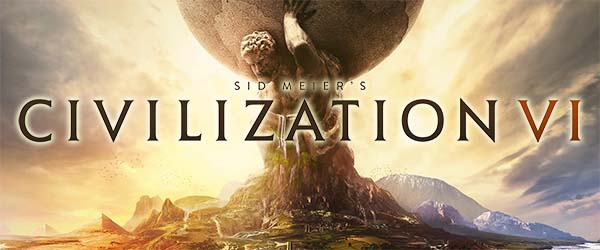
With the New Frontiers Pass for Civ VI over, an "Anthology" edition of Civ VI on sale, and no news at all regarding future DLC or expansions, I'm assuming that Firaxis has finished with Civ VI. As such, I want to look back on the game and reflect on the things that I liked most about it, and the things that annoyed me the most.
After the lifespan of Civilization V had ended, I wrote up a pair of retrospective blogs about my personal Top 10 Good Ideas and Top 10 Bad Ideas that went into that game. I'll be doing the same thing now with Civ VI.
I want to stress that this is a list of 10 good and bad ideas -- not necessarily good and bad mechanics. Some of the good ideas will be ideas that I like in principle (or on paper), but which might need more iteration before they truly work as intended. In contrast, there may be some bad ideas that work fine mechanically, but which hurt the "flavor" or theming of the game, in my opinion.
This is, of course, a subjective list of personal favorite and disliked concepts in the game. I'm sure there will be a lot of disagreement, and some of the things I write here will probably be somewhat controversial with the rest of the player base. So I'm interested in reading others' feedback. So if you agree with any of my points, or you vehemently disagree, feel free to post a comment and share your thoughts.
This content is also available in video essay format via YouTube.
This first post will cover my personal Top 10 Good Ideas, and I will follow it up with the next post being about the Top 10 Bad Ideas. [More]
549df3d2-8086-446d-bb11-35103ccef5b9|1|5.0
Tags:Civilization VI, Civilization VI: Rise and Fall, Civilization VI: Gathering Storm, Civilization VI: New Frontiers Pass, Sid Meier's Civilization, retrospective, top 10, music, Christopher Tin, Baba Yetu, agenda, wall, scout, skirmisher, ranger, diplomacy, alliance, disaster, climate change, barbarian, city state, leader
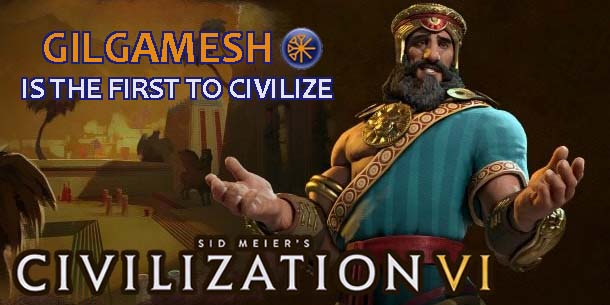
Sumer is one of the oldest civilizations known to have existed. The first permanent cities may have been settled along the Euphrates and Tigris rivers of Mesopotamia (modern day Iraq) as early as 5500 B.C., and written records date back as far as 3300 B.C.. The Sumerians were among the first adopters of agriculture, as the fertile floodplains of the "cradle of civilization" allowed for an abundance of food that enabled large, urban population centers.
Gilgamesh is an epic hero and king in Sumerian mythology. The Epic of Gilgamesh (transcribed in cuneiform on stone tablets) is the oldest surviving work of literature, and is credited as the world's first work of great literature. Copies of the poem were discovered in the ruins of the royal library of the Assyrian king Ashurbanipal. According to the epic poem, Gilgamesh was a demi-god who is best known for taming the wild, feral man Enkidu and forging a lasting friendship with him. The two adventured together many times before Enkidu was killed by the gods for defying their will and helping Gilgamesh to kill the sacred Bull of Heaven. The death of his friend sent Gilgamesh into depression, and he dedicated the rest of his life (according to the poem) to a futile search for eternal life. Scholars and historians originally dismissed Gilgamesh as a mythological figure, but archaeological finds suggest that he may have been a real historic king of Uruk sometime between 2800 and 2500 B.C.. Whether the stories are based on true events, or are purely myth, they can be seen as an allegory for civilization itself, which Sumer, and Gilgamesh, helped to establish.
DISCLAIMER:
Civilization VI is still very early in its life-cycle. Strategies for the game (and for specific leaders and civs) may change as Firaxis applies balance patches, introduces new features, or expands the game through DLC or expansion packs, or as the Civ community discovers new strategies. As such, the following strategy guide may change from time to time. I will try to keep it up-to-date, and will make notations whenever changes are made. I'll also post links in the official 2K forums and CivFanatics, where I'll also report any changes made. If possible and practical, I will try to retain the original content of the strategy for posterity.
I welcome any feedback or suggestions that readers wish to offer. Feel free to post on the linked forums, or by posting a comment at the bottom of the page.
This guide is up-to-date as of the December 2016 patch (ver. 1.0.0.56).
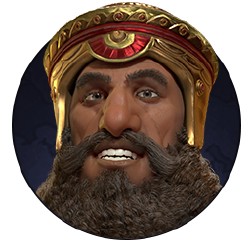
Gilgamesh might be a very good leader for beginners to the game. Gilgamesh encourages making friends and allies, and his uniques grant early game bonuses that will help new players get off to a good start. The bonus reward for clearing barbarian encampments will also help teach new players to build a sizeable early military and go hunting for barbarians, which is a good strategy for Civ VI in general, regardless of your leader or civ. So I recommend Gilgamesh as a good place to start, and he will be the subject of my first Civilization VI strategy guide! [More]
83c3f824-13a8-4896-8e42-7df26a0e763a|4|4.0
Tags:Sid Meier's Civilization, Civilization VI, Sumeria, Sumer, Gilgamesh, War Cart, Ziggurat, Adventures of Enkidu, Enkidu, Epic Quests, barbarian, outpost, tribal village, goody hut, warmonger, unique improvement, unique mounted unit, heavy calvary, horse, iron, donkey, science, culture, heavy chariot

Civilization VI may look very similar to Civilization V at a glance, but once you start playing it, you're going to notice a lot of subtle differences. One of the most immediate differences will be the changes to unit-movement rules with respect to terrain. Units still travel on hexes, and terrain such as hills and forests still slow down movement, just as in the previous game. But this time around, the cost to enter a tile must be paid before entering that tile! This is a small, but significant change of rules that may force you to change the way that you explore the map.
The rewards of exploration are many, and finding these rewards is key to a good start.
Efficient exploration is key to getting off to a good start in Civilization. And a good start is key to success at higher difficulties and in competitive multiplayer. This is still true in Civilization VI. First and foremost, exploration will reveal valuable real estate for settling your first few cities, including resources, coast lines, and natural wonders. An efficient explorer will also be likely to uncover more tribal villages (i.e. "goody huts"), which will grant tech boosts, extra money, free units, or a head start towards founding your own pantheon. Efficient exploring will also introduce you to more city states, and you'll be more likely to be the first player to meet the city state. Being first to meet a city state will grant you a free envoy. This will grant you an immediate bonus depending on the type of city state, and it will put you one step closer to unlocking additional bonuses and becoming the suzerain of that city state.
So now that we've seen the rewards and benefits that await our exploration of the map, let's take a look at those new movement rules and how they'll impact our early exploration... [More]
34003f4c-d37b-4dae-b69d-b6175f32dc49|1|5.0
Tags:Sid Meier's Civilization, Civilization VI, unit, movement, hex, exploration, hill, forest, jungle, river, terrain, scout, warrior, city, city state, suzerain, natural wonder, ancient ruin, eureka, barbarian, encampment, pillage
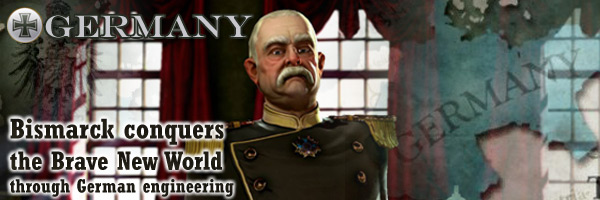
Continuing my series of strategy posts about Brave New World's modified civilizations, I'm going to take a look at strategies for Bismarck's well-rounded Germany. Since Brave New World's fall patch, Germany's unique Landsknecht has been replaced with a Hanse (bank replacement) that makes Germany into a more well-rounded civ rather than being exclusively military-focused.
The region of Germany has been the site of some of the most violent and destructive wars in the history of the world. It was given its name by Julius Caesar, who called the region east of the Rhine "Germania" to differentiate it from Gaul, which he had already subjugated. The region was populated by tribes of Germanic people who were often labeled as barbarians by the Romans who were never able to fully annex the territory. Most of German lands were controlled by the Franks such as Charlemagne following the fall of the Roman Empire, and they would not be united into their own sovereign nation until Otto I would become the first emperor of the Holy Roman Empire in 962 C.E.. When Martin Luther founded the schism religion of Protestantism, the Holy Roman Empire descended into the Thirty Years War, in which the northern Protestants fought for their autonomy against the southern Catholics. Following the war, the lands of Germany were broken up into multiple nation states such as Prussia and Saxony.
In the aftermath of the Napoleonic Wars, a series of social and industrial revolutions drove Prussia into becoming a leading educational and cultural states in Europe, and its Chancellor Otto von Bismarck effectively established the modern Germany in 1871. The German economy grew over the next few decades, but it was defeated in World War I, forced to pay reparations, its leadership was replaced with an unstable republic, and its economy completely crashed. All this lead to a takeover by the National Socialists (Nazis) who rapidly rebuilt Germany's economy and industry and turned it into a war machine that struck with greater speed and efficiency than the world had ever seen. Despite all the bitter bloodshed, a democratic Germany has emerged from the chaos as one of the strongest economies in Europe and is a worldwide leader in technological, scientific, and cultural development (and humor).
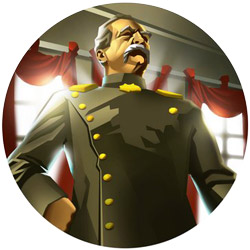
Otto Eduard Leopold, Prince of Bismarck, Duke of Lauenburg is known more simply as Otto von Bismarck. He is responsible for uniting the fractured states of Germany into a modern, unified German nation through the use of an efficient military and shrewd diplomacy. He was known to have a violent temper, but was a brilliant statesman and diplomat nonetheless. He became famous for using balance of power strategies to maintain peace in Europe while also furthering his goals as the political leader of Germany. Though he was staunch conservative autocrat, he did pass a series of social reforms that improved the quality of life for Germans. This, combined with his strong leadership, made him beloved by the German people. He was eventually unseated by Kaiser Wilhelm II, whose aggressive expansionist policies are often credited with leading to World War I. [More]
653da07c-1d18-4a6d-8daa-63dd483d304a|3|5.0
Tags:Sid Meier's Civilization, Civilization V: Brave New World, Civilization V, Germany, Bismarck, Otto von Bismarck, Furor Teutonicus, Hanse, Panzer, barbarian, encampment, unit maintenance, unit cap, trade route, production, tank, bank, Landsknecht, city state, Civ V Fall Patch, Civ-V
|

| 12 | | | | | | | 60 | | 11 | | | | | | | 55 | | 10 | | | | | | | 50 | | 09 | | | | | | | 45 | | 08 | | | | | | | 40 | | 07 | | | | | | | 35 | | 06 | | | | | | | 30 | | 05 | | | | | | | 25 | | 04 | | | | | | | 20 | | 03 | | | | | | | 15 | | 02 | | | | | | | 10 | | 01 | | | | | | | 05 |
|